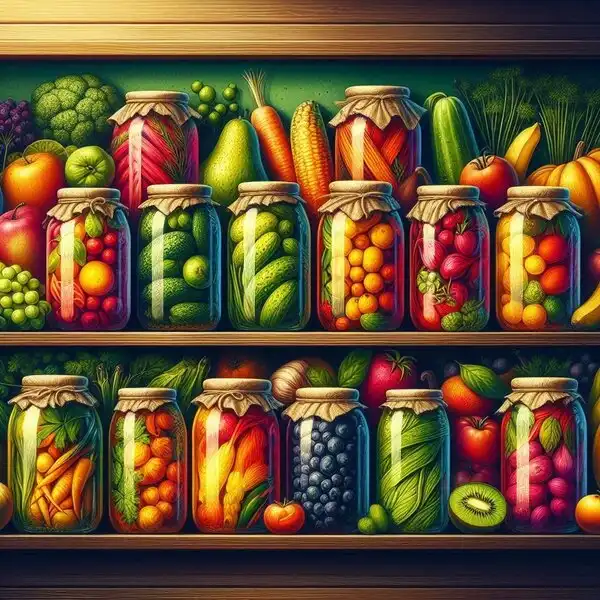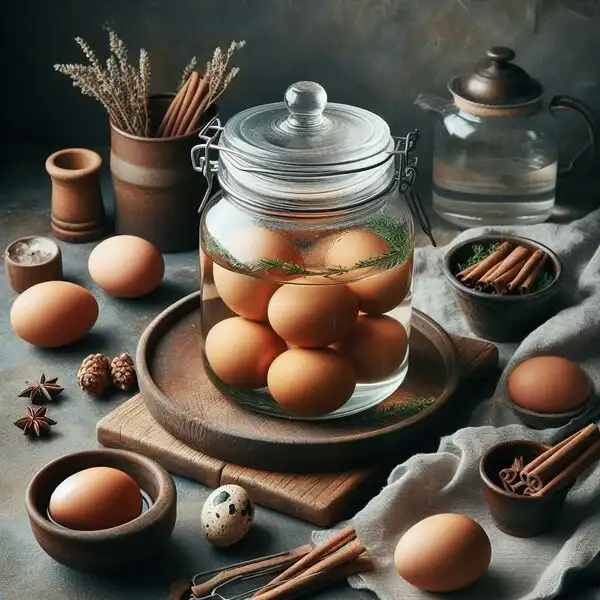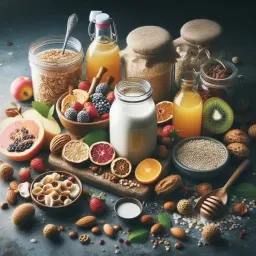Mastering Water Glassing: Your Ultimate Guide to Preserving Eggs
Section 1: Introduction to Water Glassing Eggs
In the realm of homesteading, where self-sufficiency is prized, the art of preserving food is a cornerstone skill. Among the plethora of preservation methods, water glassing eggs stands out as a simple yet highly effective technique for extending the shelf life of this dietary staple.
Brief Overview of Water Glassing Eggs
Water glassing, also known as "water-glassing" or "water-glassing," is a time-honored method of preserving eggs that dates back centuries. It involves submerging fresh, unwashed eggs in a solution of water and hydrated lime or sodium silicate. This forms a protective coating around the eggshell, sealing it off from air and bacteria, thus prolonging its freshness for an extended period.
Importance of Preserving Eggs for Long-Term Storage
For those who raise backyard chickens, the cyclical nature of egg production is a familiar phenomenon. As daylight hours fluctuate with the seasons, so too does the output of our feathered friends. During peak production times, such as spring and summer, eggs abound. However, as winter approaches and daylight diminishes, egg production often dwindles, leaving homesteaders with a surplus during one season and a scarcity during another.

Enter water glassing, a solution to this seasonal conundrum. By preserving eggs when they are abundant, homesteaders can ensure a steady supply of fresh eggs throughout the year, even when their hens are on hiatus.
Highlighting the Simplicity and Affordability of Water Glassing Eggs
One of the most appealing aspects of water glassing eggs is its simplicity. Unlike some preservation methods that require specialized equipment or intricate procedures, water glassing can be accomplished with just a few basic ingredients and minimal effort. Moreover, these ingredients are typically readily available and affordable, making water glassing an accessible option for homesteaders of all levels of experience and means.
TIP: Store leftovers in airtight containers and label them with dates to keep track of freshness and reduce food waste.
Mentioning the Popularity of Water Glassing Eggs Among Homesteaders
Within the homesteading community, water glassing eggs has gained widespread acclaim as a reliable and efficient method of egg preservation. Whether shared through word of mouth, online forums, or instructional videos, the knowledge of water glassing has been disseminated far and wide, earning it a prominent place in the repertoire of homesteading skills.
As we delve deeper into the nuances of water glassing eggs, we will uncover not only the practicalities of the preservation process but also the safety considerations, taste and texture comparisons, and step-by-step instructions for mastering this time-honored technique.
FAQs
Q: What is water glassing eggs? A: Water glassing eggs is a preservation method that involves submerging fresh, unwashed eggs in a solution of water and either hydrated lime or sodium silicate to extend their shelf life.
Q: Why is water glassing eggs important? A: Water glassing eggs allows homesteaders to preserve eggs during times of abundance for consumption during periods of scarcity, ensuring a steady supply of fresh eggs throughout the year.
Q: Is water glassing eggs a complicated process? A: Not at all! Water glassing eggs is a simple and straightforward technique that requires minimal ingredients and effort, making it accessible to homesteaders of all skill levels.
Q: Why is water glassing eggs popular among homesteaders? A: Water glassing eggs has gained popularity among homesteaders due to its effectiveness, simplicity, and affordability, making it an attractive option for extending the shelf life of eggs.
Q: Can water glassing eggs be done with store-bought eggs? A: No, it's best to use farm-fresh, unwashed eggs for water glassing, as store-bought eggs have typically been washed, removing their natural protective coating.
Key Takeaways
- Water glassing eggs is a time-honored method of preserving eggs that dates back centuries.
- Preserving eggs through water glassing ensures a steady supply of fresh eggs year-round, regardless of seasonal fluctuations in production.
- Water glassing eggs is simple, affordable, and accessible to homesteaders of all levels of experience.
- The popularity of water glassing eggs within the homesteading community attests to its efficacy and reliability.
Stay tuned as we explore the safety and effectiveness of water glassing eggs in the next section of our ultimate guide!
Section 2: Safety and Effectiveness of Water Glassing
In the realm of food preservation, safety is paramount. When it comes to water glassing eggs, ensuring both the safety and effectiveness of the preservation process is essential. Let's delve into some key considerations to guarantee a successful outcome.
Addressing Common Safety Concerns
Before embarking on the water glassing journey, it's natural to have concerns about the safety of consuming preserved eggs. However, with proper knowledge and adherence to best practices, water glassing can be a safe and reliable method of egg preservation.
Hygiene and Egg Quality
One of the fundamental safety measures in water glassing eggs is the use of clean, unwashed eggs. Washing eggs removes the protective cuticle that naturally covers the eggshell, making them more susceptible to contamination. Therefore, it's crucial to collect fresh eggs from your chickens and refrain from washing them before the preservation process.
Choice of Preservative
Another critical aspect is the selection of a suitable preservative. Food-grade hydrated lime or sodium silicate are commonly used in water glassing eggs. These substances create an alkaline environment that inhibits bacterial growth, preserving the eggs for an extended period.
Emphasizing the Age-Old Tradition of Water Glassing
Water glassing eggs is not a novel concept; it's a practice that has been passed down through generations of homesteaders. The longevity of this preservation method speaks to its efficacy and reliability over time. By following time-tested techniques and recipes, homesteaders can confidently preserve their eggs for long-term storage.
Importance of Proper Storage and Regular Inspection
While water glassing eggs can significantly extend their shelf life, proper storage and regular inspection are paramount to maintaining their quality. Here are some key guidelines to ensure the safety and effectiveness of water-glassed eggs:
- Cool, Dark Environment: Store water-glassed eggs in a cool, dark place away from direct sunlight. Excessive heat can compromise the integrity of the preservation solution, leading to spoilage.
- Regular Inspection: Check the preserved eggs periodically for any signs of spoilage, such as foul odors or abnormal discoloration. Promptly discard any eggs that show signs of deterioration to prevent foodborne illness.
FAQs
Q: Is water glassing eggs safe? A: Yes, when done correctly, water glassing eggs is a safe method of preservation. It's essential to use clean, unwashed eggs and food-grade preservatives.
Q: How long can water-glassed eggs be stored? A: Water-glassed eggs can last up to 18 months when stored properly in a cool, dark environment.
Q: Can I use other preservatives besides hydrated lime or sodium silicate?
A: While hydrated lime and sodium silicate are commonly used in water glassing eggs, it's essential to stick to tested and approved methods to ensure safety and effectiveness.
Find out everything you need to know about Delve into effortless lettuce cultivation guide in our detailed article. It's a valuable resource for anyone looking to learn more.
Q: What are the signs of spoilage in water-glassed eggs? A: Signs of spoilage may include foul odors, abnormal discoloration, or the presence of mold. It's crucial to inspect preserved eggs regularly and discard any that show signs of deterioration.
Key Takeaways
- Hygiene is key: Use clean, unwashed eggs for water glassing to maintain their natural protective coating.
- Choose the right preservative: Opt for food-grade hydrated lime or sodium silicate to create an alkaline environment that inhibits bacterial growth.
- Proper storage is essential: Store water-glassed eggs in a cool, dark place and inspect them regularly for signs of spoilage.
By adhering to these safety guidelines and best practices, homesteaders can confidently preserve their eggs through water glassing, ensuring a steady supply of fresh eggs year-round.
Stay tuned as we explore the taste and texture of water-glassed eggs in the next section of our ultimate guide!
Section 3: Taste and Texture of Water-Glassed Eggs
When it comes to preserving eggs through water glassing, one common concern among homesteaders is how this method might affect the taste and texture of the eggs. Let's explore this aspect in detail to dispel any doubts and provide insights into the culinary experience of water-glassed eggs.
Does Water Glassing Affect Taste and Texture?
Taste Perception
The taste of eggs preserved through water glassing may exhibit subtle differences compared to fresh eggs, but these disparities are not necessarily negative. In fact, many homesteaders appreciate the unique flavor profile that water-glassed eggs offer.
- Subtle Flavor Alterations: Water-glassed eggs may have a slightly firmer texture once cooked and a more intense flavor. Some individuals describe the taste as richer and more savory, adding depth to dishes prepared with these preserved eggs.
- Personal Experiences: Anecdotal evidence often highlights the positive culinary outcomes of using water-glassed eggs. Many homesteaders report enjoying the distinct taste of these preserved eggs in various recipes, from omelets to baked goods.
Texture Analysis
In terms of texture, water-glassed eggs retain much of their original consistency, with minor alterations that are barely perceptible to the average palate.
- Visual Differences: Upon cracking open a water-glassed egg, you may notice a slight cloudiness in the egg white and a "flatter" appearance of the yolk. However, these visual cues do not significantly impact the overall texture of the cooked egg.
- Cooking Performance: Water-glassed eggs behave similarly to fresh eggs when cooked, maintaining their structural integrity and providing a satisfying culinary experience. Whether scrambled, fried, or used in baking, water-glassed eggs deliver consistent results.
Conducting Taste Tests and Adjusting Preferences
To fully appreciate the nuances of water-glassed eggs, homesteaders can conduct taste tests to compare them with fresh eggs. This experiential approach allows individuals to discern any subtle flavor differences and adjust their preferences accordingly.
- Blind Taste Tests: Prepare dishes using both fresh and water-glassed eggs without disclosing which is which. Encourage family members or friends to participate in blind taste tests to evaluate any discernible variations in taste and texture.
- Personal Preference: Ultimately, taste preferences vary among individuals. Some may prefer the enhanced richness of water-glassed eggs, while others may prefer the milder flavor of fresh eggs. Experimenting with different recipes and cooking methods can help identify the optimal use of water-glassed eggs in your culinary repertoire.
FAQs
Q: Do water-glassed eggs taste different from fresh eggs? A: Water-glassed eggs may have a slightly firmer texture and a more intense flavor compared to fresh eggs, but the differences are subtle and often well-received.
Q: Can I use water-glassed eggs in all types of recipes? A: Yes, water-glassed eggs can be used in a wide range of recipes, including baking, frying, and scrambling. They behave similarly to fresh eggs when cooked and offer consistent results.
Q: How can I determine if water-glassed eggs are right for me? A: Consider conducting taste tests with water-glassed eggs to assess their flavor and texture compared to fresh eggs. Experiment with different cooking methods and recipes to determine your preferences.
Key Takeaways
- Subtle Flavor Enhancements: Water-glassed eggs may offer a richer and more savory flavor profile compared to fresh eggs.
- Consistent Texture: Despite minor visual differences, water-glassed eggs retain much of their original texture and cooking performance.
- Personal Preference Matters: Experimentation and taste tests can help individuals identify their preferences for water-glassed eggs in various culinary applications.
By understanding the taste and texture nuances of water-glassed eggs, homesteaders can confidently incorporate this preservation method into their culinary endeavors, ensuring a continuous supply of fresh and flavorful eggs year-round.
Stay tuned for the next section, where we'll provide a step-by-step guide to water glassing eggs!
Section 4: Step-by-Step Guide to Water Glassing Eggs
Preserving eggs through water glassing is a time-tested method that offers homesteaders a simple and effective way to ensure a steady supply of fresh eggs year-round. In this section, we'll provide you with a comprehensive step-by-step guide to successfully water glassing eggs in your own kitchen.
Supplies and Ingredients
Before you embark on your egg preservation journey, gather the necessary supplies and ingredients to ensure smooth execution of the water glassing process.
Supplies:
- Glass Jars: Choose clean, wide-mouthed glass jars with tight-fitting lids for storing the water-glassed eggs.
- Food-Grade Hydrated Lime: Ensure the lime you use is food-grade and free from any additives or impurities.
- Fresh, Unwashed Eggs: Collect eggs from your backyard chickens or source them locally. Avoid washing the eggs, as the natural protective coating (cuticle) helps maintain their integrity during the preservation process.
- Filtered Water: Use clean, filtered water to prepare the preserving solution for optimal results.
Ingredients:
- Food-Grade Hydrated Lime: This alkaline substance creates a protective coating around the eggs, preventing bacterial growth and extending their shelf life.
- Filtered Water: Used to dilute the hydrated lime and create the preserving solution.
Step-by-Step Directions
Follow these detailed instructions to preserve your eggs using the water glassing method:
Prepare the Preserving Solution:
- In a clean container, mix 1 part food-grade hydrated lime with 9 parts filtered water. Stir well until the hydrated lime is fully dissolved, creating a clear solution.
Select and Prepare Eggs:
- Choose fresh, unwashed eggs for preservation. Inspect each egg for cracks or blemishes, discarding any that are damaged.
- Gently wipe any visible dirt or debris from the eggs using a dry cloth. Avoid washing the eggs, as water can remove the protective cuticle.
Place Eggs in Glass Jars:
- Carefully place the prepared eggs into the clean glass jars, ensuring they are arranged in a single layer with minimal touching.
Pour the Preserving Solution:
- Slowly pour the prepared preserving solution over the eggs in the glass jars, completely submerging them. Leave approximately 1 inch of headspace at the top of each jar to allow for expansion.
Seal Jars and Store:
- Securely seal the glass jars with their lids to prevent contamination and evaporation of the preserving solution.
- Store the water-glassed eggs in a cool, dark location away from direct sunlight and extreme temperatures. A pantry or cellar is an ideal storage spot.
Regular Inspection:
- Periodically inspect the water-glassed eggs for any signs of spoilage, such as foul odors or unusual discoloration. Discard any eggs that show signs of deterioration to prevent contamination.
Tips for Success
- Use Fresh Eggs: Start with fresh, unwashed eggs to ensure optimal preservation results.
- Maintain Proper Storage: Store the water-glassed eggs in a cool, dark place with stable temperatures to prolong their shelf life.
- Regularly Check for Spoilage: Perform routine inspections of the preserved eggs to identify any issues early and prevent contamination.
- Experiment with Batch Sizes: Start with a small batch of water-glassed eggs to familiarize yourself with the process before scaling up production.
By following these step-by-step instructions and incorporating our tips for success, you can master the art of water glassing eggs and enjoy a continuous supply of fresh eggs throughout the year.
Stay tuned for the conclusion, where we'll summarize the benefits of water glassing eggs and encourage you to embark on your own egg preservation journey!

 Emma
Emma

